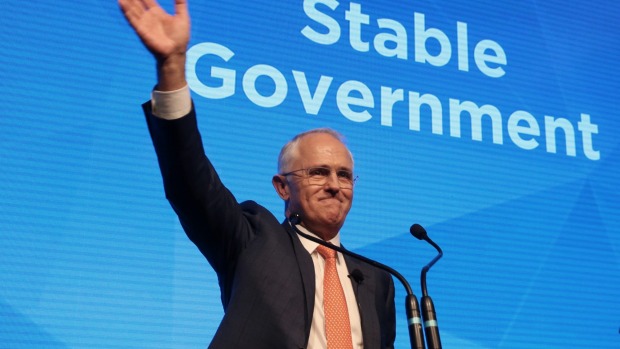A bipartisan climate platform may be Turnbull’s last chance to make a mark on his nation.

Malcolm Turnbull at his election launch a week ahead of the election, when he argued that a majority Coalition government was the only acceptable outcome. PHOTO Andrew Meares, Australian Financial Review
Knife-edge elections have a history of delivering decisive political shifts.
“The people have spoken, but it will take a while to determine exactly what they said,” was retiring president Bill Clinton’s comment on the 2000 US presidential election between Al Gore and George W. Bush.
We still don’t know what the people said because it was the Supreme Court, more than a month after the vote, which effectively determined the result by shutting down a recount in Florida.
Julia Gillard used Clinton’s words to describe her own cliff-hanger in August 2010. She won office on the back of 17 days of intense negotiations, but many continued to claim this wasn’t what the voters wanted.
Both these elections proved fateful for the cause of climate action. Climate activist Gore’s loss to Bush ensured that for a crucial eight years America would do nothing about its carbon emissions.
The 2010 outcome allowed Gillard and her Green allies to implement a comprehensive suite of climate measures, but it was also the spark for a long, bitter campaign by Tony Abbott to expunge all trace of those measures from the legislative record.
His decisive 2013 victory secured abolition of Gillard’s centrepiece, the carbon price scheme, but that’s all. Bolstered by hostility over Abbott’s disastrous first budget, the Senate refused to kill off other climate measures. Abbott himself was the next casualty.
Many Australians thought climate policy would benefit from Malcolm Turnbull’s leadership. But then he defended Abbott’s ineffectual measures and embarked on a policy-free election campaign. He’s been little more than a weak echo of his predecessor.
Now the people have again spoken, and again we don’t yet know what they said. Maybe we shouldn’t expect to; fuzzy outcomes are in the nature of democracy.
Saturday’s low primary count for major parties brings complexity and uncertainty, but that’s really nothing special. It reflects what’s happening in democracies around the world, with old orthodoxies under challenge as never before.
What’s more interesting is that this is the ninth national election in Australia since the world first agreed in 1992 that humans were changing the climate.
That’s nine chances for voters to consider and reconsider what Australia should do to help curb global warming. Nine chances for governments to get it right.
The sad truth, despite all these opportunities, is that they haven’t. Periods of progress have been cut short by partisan struggles for short-term political gain. Ultimately, everyone has lost.
The left-right political divide may still resonate in some social and economic debate, reflecting age-old struggles between the wealthy and the underclasses. But what on earth does it have to do with climate change?
We heard a lot about many things in this campaign, but not climate. The government adopted a position of mentioning it only when forced to, and then only by repeating the falsehood that Australian emissions are under control when in fact they’re continuing to rise.
We’re told that Malcolm Turnbull’s refusal to open up about climate policy is the result of a deal with the Nationals and the Abbott faction in his own party, both of which, for reasons best known to them, regard climate policy as a closed book.
The Coalition’s success in keeping climate out of the campaign debate reflects badly on news media’s failure to call out the government for its silence and open up policies to proper scrutiny.
With each passing election, the danger from climate change grows clearer and more pressing. We’re out of time. This new term of government has to deliver enduring solutions, and continued partisan division is no longer an option.
In April opposition leader Bill Shorten invited the PM to “take climate change out of the realm of petty partisan right-wing politics”. Whatever the motive, it’s an offer Turnbull shouldn’t refuse.
With his prime ministerial career in danger of sinking without a trace, a bipartisan climate change platform may be his only chance to make a mark on his nation. God knows, the country needs it.
